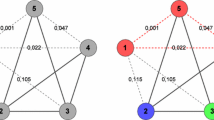Abstract
The paper introduces the finite class of set strategies for stochastic scheduling problems. It is shown that the knownstable classes of strategies such as ES and MES strategies are of this type, as arelist-scheduling strategies such as LEPT and SEPT and other, more complicatedpriority-type strategies. Roughly speaking, set strategies are characterized by the fact that the decision as to which jobs should be started at timet depends only on the knowledge of the two sets of jobs finished up to timet and being processed at timet. Contrary to list scheduling strategies, set strategies may involve deliberate idleness of machines, i.e. may not be greedy and can therefore not generally be induced by priority rules. It is demonstrated that set strategies have useful properties. They are e.g.λ n-almost everywhere continuous and therefore show satisfactorystability behaviour w.r.t. weak convergence of the joint distribution of job durations. Furthermore, the optimum w.r.t.all strategies is already attained on this class if job durations are independent and exponentially distributed and the performance measure fulfills a certainshift condition. This shift property is a quite natural concept and generalizes aspects of the notion ofadditivity in semi-Markov decision theory and stochastic dynamic optimization. Its complete analytical characterization is a major object of this paper. Typical additive cost criteria such as makespan and flowtime are of course covered, which yields simultaneously a first step towards generalization of optimality of LEPT and SEPT rules, as known for special cases. In fact, in view of the obtained optimality result, the question of when deliberate idleness of machines can be avoided, gains considerable interest, as it characterizes stochastic environments in whichpriority strategies are optimal. This provides a major link with current research on the analysis of networks of queues in the context of computer systems.
Similar content being viewed by others
References
Aczél, J.: Vorlesungen über Funktionalgleichungen und ihre Anwendungen. Birkhäuser Verlag, Basel, 1961.
Bauer, H.: Wahrscheinlichkeitstheorie. De Gruyter, Berlin, 1968.
Bertsekas, D.P., andS.E. Shreve: Stochastic Optimal Control. The Discrete Time Case, Academic Press, New York 1978.
Billingsley, P.: Convergence of Probability Measures. Wiley, New York 1968.
Dempster, M.A.H., J.K. Lenstra andA.H.G. Rinnooy Kan (eds.): Deterministic and Stochastic Scheduling. D. Reidel Publishing Company, Dordrecht, 1982.
Dempster, M.A.H.: A stochastic approach to hierarchical planning and scheduling. In: Dempster M.A.H. et al. (eds.), Deterministic and Stochastic Scheduling, D. Reidel Publishing Company, Dordrecht 1982, 271–296.
Elmaghraby, S.E.: Activity Networks. Wiley, New York 1977.
Fishburn, P.C.: Utility Theory for Decision Making. Wiley, New York 1970.
Fisher, M.L.: Worst-case analysis of heuristic algorithms for scheduling and packing. In: Dempster M.A.H. et al. (eds.), Deterministic and Stochastic Scheduling, D. Reidel Publishing Company, Dordrecht 1982, 15–34.
Gewald, K., K. Kaspar andH. Schelle: Netzplantechnik. Band 2: Kapazitätsoptimierung, R. Oldenbourg, München 1972.
Golumbic, M.C.: Algorithmic Graph Theory and Perfect Graphs. Academic Press, New York 1980.
Graham, R.L.: Bounds on the performance of scheduling algorithms. In: Coffman, E.G. (ed.), Computer and Job-Shop Scheduling Theory, Wiley, New York 1976, 165–227.
Hinderer, K.: Foundation of Non-stationary Dynamic Programming with Discrete Time Parameter, Springer Verlag, Berlin 1970.
—: Grundbegriffe der Wahrscheinlichkeitstheorie. Springer Verlag, Berlin 1972.
Igelmund, G., andF.J. Radermacher: Preselective strategies for the optimization of stochastic project networks under resource constraints. Networks 13, 1983, 1–29.
—: Algorithmic approaches to preselective strategies for stochastic scheduling problems. Networks 13, 1983, 29–48.
Kaerkes, R., R.H. Möhring, W. Oberschelp, F.J. Radermacher, andM.M. Richter: Netzplanoptimierung: Deterministische und stochastische Scheduling-Probleme über geordneten Strukturen. Springer Verlag, (to appear).
Lovasz, L.: Submodular functions and convexity. In: A. Bachem et al. (eds), Mathematical Programming, The State of the Art, Springer, Berlin, 1983, 235–257.
Möhring, R.H., F.J. Radermacher, andG. Weiss: Stochastic scheduling problems I: general strategies ZOR28 (7), 1984, 193–260.
-: Stochastic scheduling problems III: tractable cases, in preparation.
Pinedo, M.: On the computational complexity of stochastic scheduling problems. In: Dempster, M.A.H. et al. (eds.), Deterministic and Stochastic Scheduling, D. Reidel Publishing Company, Dordrecht 1982, 335–365.
Radermacher, F.J.: Kapazitätsoptimierung in Netzplänen. Math. Syst. in Econ.40, Anton Hain, Meisenheim 1978.
—: Schedule-induced posets. Preprint RWTH Aachen, 1982.
—: Optimale Strategien für stochastische Scheduling-Probleme. Habilitationsschrift, 1981, in: Schriften zur Informatik und Angewandten Mathematik, Nr. 98, RWTH Aachen, 1984.
Ross, S.M.: Applied Probability Models with Optimization Applications. Holden-Day, San Francisco 1970.
Royden, H.L.: Real Analysis. The Macmillan Company, London, 1968.
Rudin, W.: Principles of Mathematical Analysis (2nd ed.). MacGraw-Hill, New York 1964.
Strauch, R.: Negative dynamic programming. Ann. Math. Statist.37, 1966, 871–890.
Weiss, G.: Multiserver stochastic scheduling. In: Dempster, M.A.H. et al. (eds.), Deterministic and Stochastic Scheduling, D. Reidel Publishing Company, Dortrecht 1982, 157–179.
Weiss, G., andM. Pinedo: Scheduling tasks with exponential service times on non-identical processors to minimize various cost functions. J. Appl. Probability17, 1980, 187–202.
Author information
Authors and Affiliations
Additional information
The work of the first two authors was supported by the Minister für Wissenschaft und Forschung des Landes Nordrhein-Westfalen, while the work of the last author was supported by DAAD.
Rights and permissions
About this article
Cite this article
Möhring, R.H., Radermacher, F.J. & Weiss, G. Stochastic scheduling problems II-set strategies-. Zeitschrift für Operations Research 29, 65–104 (1985). https://doi.org/10.1007/BF01918198
Received:
Revised:
Issue Date:
DOI: https://doi.org/10.1007/BF01918198




